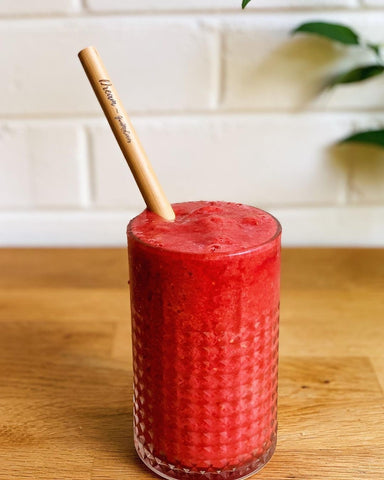It’s July, which means Plastic Free July is back - an initiative that allows everyone to learn and work towards Plastic Free Foundation’s vision of seeing a world free of plastic waste.
At GiveMeCocos, we are an eco-friendly, sustainable, completely plastic free brand. Therefore Plastic Free July is an initiative that is very important to us, and we hope it will be very important for you too.
By taking on the Plastic Free July initiative, you will actively learn about plastic waste and tips on how you can reduce your plastic waste footprint - whether you start with small changes, or challenge yourself to take it as far as you can. The choice is up to you - either way, you’ll be making a difference in helping the world get rid of single-use plastic.
We hope that by taking on the Plastic Free July initiative, it will inspire you to continue to implement these changes in your everyday life in July and beyond.
Some Quick Facts On Single-Use Plastic
 380 million tons of plastic is produced each year, with up to 50% of that is single-use plastic - used for just a few moments, but will be on the planet for at least several hundred years.
380 million tons of plastic is produced each year, with up to 50% of that is single-use plastic - used for just a few moments, but will be on the planet for at least several hundred years.
Plastic is bad for everyone and everything - the environment, animals and people. According to Plastic Oceans International:
- 10 million tons of plastic is dumped into our oceans annually
- 1 million marine animals are killed by plastic pollution each year
- Humans eat around 18 kilograms of plastic in their lifetime

How To Do Plastic Free July
The use of plastic is everywhere - when you’re out and about (plastic water bottles and plastic takeaway containers), shopping (long-life cartons and pre-packed fruit and vegetables), and at home (food storage and hygiene care). But it doesn’t have to be like this.
Are you ready to take on the Plastic Free July challenge, and reduce your plastic waste footprint? Below are numerous ways that can help you to achieve this - for not only this month, but also beyond.
WHEN OUT
It can seem more convenient to use single-use plastic items when we’re out and about; such as plastic water bottles and plastic takeaway containers. But there are plastic free ways to stop this which are easy, more eco-friendly, and more convenient than you may have thought so at first. Try the following plastic free alternatives while you’re out during this Plastic Free July.
- Water Bottles
Plastic water bottles end up in landfills and impact millions of habitats and animals.
To stop plastic water bottle pollution, avoid buying single-use plastic water bottles by carrying your own reusable alternative with you - make sure it's a socially-responsible and environmentally-friendly alternative, such as stainless steel, safe aluminium, or glass.
If you forget your water bottle, you can buy a glass bottle of water and reuse it.
-
Straws

Single-use plastic straws are lightweight and can be easily blown down drains and into waterways, rivers and oceans - where animals can find them and mistake them as food, and can become stuck in their airways, both being fatal for them.
If you're able to, request your drink be made without a single-use plastic straw. And if you need a straw, bring your own sustainable alternative - such as stainless steel, bamboo, glass or foldable reusable straws.
GiveMeCocos has bamboo straws that come in a carry pouch, so you can easily keep them in your bag when you're out. Get yours here
TAKEAWAY
- Reusable Coffee Cups
In most locations, coffee cups are not recyclable. ‘Compostable’ cups are rarely composted as they require specific conditions and facilities.
Avoid takeaway coffee cups by bringing your own reusable alternative - that is socially-responsible and environmentally-friendly, made out of ceramic, glass, or stainless steel.
- Reusable Utensils
Single-use utensils are used for a few minutes but remain in the environment forever - even compostable utensils have its limitations.
Pack a set of reusable cutlery to take with you when getting take away and eating it on the go - a fork, spoon and knife from your home wrapped in a cloth, pouch, or container will work.
You can also use GiveMeCocos wooden fork, spoon, and chopsticks; a natural and sustainable choice, which can all be easily taken with you. Get yours here

- Reusable Containers
If the restaurant and cafe allows it, bring your own container from home for your takeaway instead of using a single-use takeaway container.
SHOPPING
- Buy Less
Before you buy, stop and think about the low or no waste options: Is there a better alternative? Do I need this? Do I need this much? A good place to start doing this is to take the packaging into consideration.
You can reduce the resources needed to create new products by buying less - as up to 70 kilograms can be created upstream, for every 1 kilogram of rubbish created at home.
- Bulk Food Shopping
Refuse groceries that use single-use plastic packaging by shopping at a bulk food store or choosing the loose option at the grocery store. Many stores have paper bags you can use or you can bring your own reusable containers, produce bags, and glass jars.
Bulk food shopping and choosing the loose option at the grocery store will also help you to avoid food waste, as you will only be buying what you need.
AT HOME
Single-use plastic items are a big issue at home. It can be found in every room of the house - from the bathroom to the kitchen. But there are plastic free alternatives which are easy, and more eco-friendly. Try to implement the following alternatives at home during this Plastic Free July.
- Food Storage
Plastic cling wrap is a staple item in most homes when it comes to food storage. Though it leaves behind plastic waste, and uses our natural resources to create it.
There are various alternatives to plastic cling wrap that you can use to reduce plastic pollution:
- Reusable containers to store and pack food
- Wax wraps to cover food in bowls, plates, pans, pots, and to wrap sandwiches in
- Reusable washable cloth bags; a more eco-friendly option to zip lock bags
- Bin Liners
Choose to refuse plastic bin liners, and also plastic bags, which seem to be common to use as a bin liner as well.
Some ways to stop using plastic bin liners and bags are:
- Use certified compostable bin liner bags
- Lin the bin with a few sheets of newspaper
- Use the bin with no bin liner and wash it out when needed. If you use this option and find that it makes your bin smell; try wrapping scraps that cause this in newspaper before placing them in the bin, or compost the food scraps. Composting helps the food scraps to deteriorate instead of creating methane from anaerobic landfill.

- Sanitary Items
Choose to refuse single-use sanitary items by using reusable alternatives, such as menstrual cups. These cups are inserted like a tampon, and need to be emptied and cleaned out typically a couple of times a day.
Other reusable alternatives are washable cotton pads and liners, and period underwear. These alternatives work like single-use pads, but can all be washed in the washing machine.
-
Personal Hygiene Care
There are various ways to refuse single-use plastic personal hygiene care products that will not only help you to look after the environment, but will help look after your health, and save you money in the long run! They can also be some of the easiest single-use items to swap with a reusable or low waste alternative.
One low waste alternative is you can buy pre-made products for soap, shampoo, conditioner, shaving cream, and more - in the form of a bar, without any packaging, or in a cardboard box that can be thrown into the compost once used. When buying pre-made products, especially soap, check the ingredients to make sure they don't contain palm oil - which contributes to deforestation.
You could also take an empty bottle and refill it at a bulk goods store with the product that you need.

Or you could also make your own hygiene care products, by following online recipes and tutorials.
Another single-use plastic hygiene product to refuse is plastic toothbrushes. Choose a more sustainable alternative, that is also compostable, such as a bamboo toothbrush. Though the bristles are usually made from plastic - don't forget to cut the bristles off before composting or reusing your bamboo toothbrush handle.
There is also the option to buy a toothbrush with a replaceable head, which can also help stop the need to buy a new plastic toothbrush every few months.
Health and organic stores, with grocery stores starting to do so as well, sell plastic-free toothpaste. Or you can make your own toothpaste with recipes and tutorials online.
Dental floss is also starting to be offered plastic-free alternatives, with the packaging and the actual product. Make sure to read the labelling on these products though, as they can be confusing. Dental floss in glass or cardboard packaging with silk thread is generally plastic-free, but some dental floss made from bamboo fibre can contain polyester (a plastic fibre).
Consider switching to a safety razor with replaceable stainless steel blades - this will allow you to recycle the blades and stop the use of single-use plastic razors.






